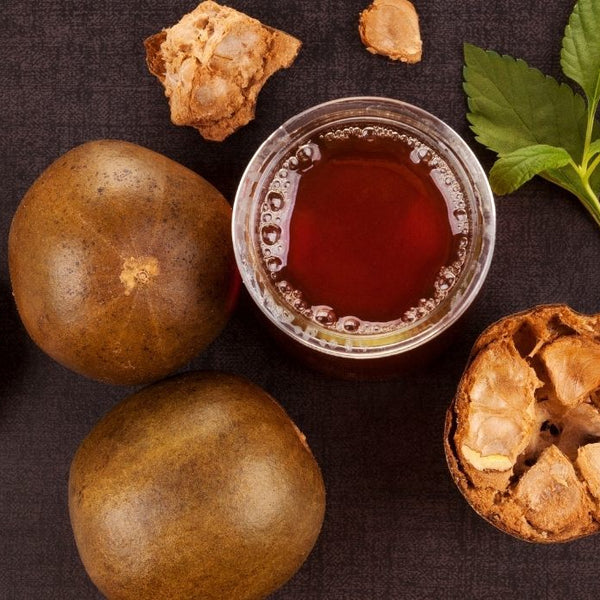
Erythritol: Your Top 5 Questions Answered
Are you a fan of keto recipes or low-carb baking? Are you looking for sugar-free alternatives to use in your baking? If so, you may have come across sugar substitutes such as xylitol and erythritol. While xylitol, which is derived from birch wood and other vegetable matter, is commonly known, you may be less familiar with erythritol (we know, it’s a bit of a tongue twister!).
Like xylitol, erythritol is used as a natural sweetener in recipes or pre-made products and mixes. To put it simply, think of it as sugar without the calories. Sounds great, right? Let’s discover the health benefits of this keto-friendly, natural sweetener while answering some of your most common questions.
What is Erythritol?
Before we dive into the good stuff, it’s important to know what erythritol sweetener really is.
First discovered 1848 by Scottish chemist John Stenhouse, erythritol is a sugar alcohol that occurs naturally in some fruits and vegetables, such as grapes, melon, and mushrooms, as well as fermented foods such as wine, soy sauce, beer, and cheese.
Industrially erythritol is made from corn starch to generate glucose, which is then fermented with yeast or another fungus.
Despite its scientific name, you’ll be surprised to know just how much erythritol you’re already consuming daily. For instance, erythritol can be found in toothpaste, chewing gum, some chocolate, and some beverages. In Japan they’ve been using erythritol in candies, jellies, jams, chocolate, yoghurt, and beverages since the early 90s. This just shows how erythritol has been a great sugar substitute since the early days.
Interesting fact about Erythritol
While it is classified as a sugar alcohol, erythritol contains no alcohol whatsoever. And here’s the best bit...whilst it resembles sugar in its white granular form, it contains significantly fewer calories despite being approximately 70% as sweet as sugar. Fantastic, right!
Although foods may contain granulated erythritol, this doesn’t always translate to foods low in carbs, fats and sugars. It is important to check the food packaging labels. At PBCo, we’ve got it all sorted out for you, so you don’t have to worry.
How Can I Use Erythritol in My Diet?
Simply use it as you would use regular sugar. That’s right, this natural sweetener is just as fine as regular sugar – it even looks just like it! You can stir some into your coffee or tea, sprinkle some over grapefruit, or even bake with it.
Ready to get started with this natural low carb keto-friendly sweetener? If you’re looking for inspo we have plenty of recipes, as well as a range of low-carb baking mixes, pantry items, and ingredients at PBCo’s online shop.
How Much Erythritol Can I Eat a Day?
Whilst there are no set guidelines around this, everyone is different! Erythritol is the most digestible sugar alcohol, meaning your body can process it quite well with minimal digestive issues. Excess consumption of Erythritol can have a laxative effect, but if you are simply using erythritol in baking, or a teaspoon in your tea and coffee, this wouldn’t be considered excess consumption.
What are the Benefits of Erythritol?
Now we’re getting to the good stuff! Before purchasing anything, one of the first questions you should ask is, how will this benefit me? Here at PBCo, we’re always seeking out the good stuff. Here are five fantastic benefits of consuming erythritol:
- Anti-diabetic properties: Erythritol makes an excellent sugar replacement for people with diabetes as it doesn’t increase glucose or insulin levels in your body. This is because 90% of it is readily absorbed into the bloodstream and excreted through the urine.
- Helps in weight loss and management: Erythritol has an exceptionally low glycaemic index of zero; therefore, adding it to your baking and beverages may minimise the blood glucose build-up that can trigger weight gain.
- Prevents dental plaque and cavities: By suppressing the growth of oral bacteria, erythritol does not contribute to the development of cavities and plaque in the way other sugars do. When compared to other natural sweeteners, like xylitol, mannitol, sorbitol, and sucralose, erythritol is the mildest of all and takes the longest to create any tooth decay.
- Gut-friendly: As noted earlier, almost 90% of erythritol consumed gets absorbed, while the remaining is easily digested - almost completely, in fact, due to its low glycaemic index and its small molecule size.
- Antioxidant: Erythritol acts as an antioxidant and may protect against hyperglycaemia induced vascular damage. Generally, some studies have shown that antioxidants may help protect cells from free radicals (unstable atoms or cells in the body) that can cause diseases. These free radicals can come from exposure to unfavourable environments that contain air pollutants, chemicals and tobacco smoke.
The Top 5 Commonly Asked Questions About Erythritol
Now let’s answer some of the most common questions we receive in regard to the use of this low-carb natural sweetener.
Q. What are the best natural sweeteners?
A. There are a few natural low-carb sweeteners in addition to erythritol that you can use as alternatives to regular sugar. These include:
- Stevia: Stevia is derived from the Stevia rebaudiana plant and contains little to no calories and carbohydrates. You can find stevia in both powder and liquid form. However, be careful to use very little, as it is much sweeter than even regular sugar.
- Xylitol: Commonly found in sugar-free gum, candies, and mint, xylitol – like erythritol – is a type of sugar alcohol. You can add xylitol to your tea, your coffee, and to your baking. And whilst it can be as sweet as sugar, the carbs in xylitol do not raise blood sugar levels. You can also use xylitol as a substitute for erythritol as both are remarkably similar in many ways. You can discover the similarities between the two here.
Monk fruit: As the name implies, this natural sweetener is extracted from the monk fruit. With no calories or carbs, this antioxidant-rich sweetener is a great option for the ketogenic diet, and you can use it in everything you would normally add sugar to. It is advised to use sparingly though, as it can be a hundred times sweeter than regular sugar. If you’re interested to learn more about the monk fruit sweetener, click here.
Q. What sweeteners should you avoid on a low carb or keto diet?
A. If you’re on a ketogenic diet then all the above-mentioned sugars are fantastic options. However, there are some natural sweeteners you may wish to avoid on a ketogenic diet as they can increase blood sugar levels and interrupt ketosis. These include:
- Honey: Whilst it is full of antioxidants and nutrients it is also high in calories and carbs.
- Maltodextrin: This sweetener alternative contains the same number of calories and carbs as plain sugar.
- Coconut sugar: Though coconut oil is popular with keto diet followers, coconut sugar is absorbed into the body at a much slower rate than regular sugar. At the same time, it is also high in fructose which can be detrimental if you’re trying to control sugar levels.
- Maple syrup: A delicious topping on pancakes, this sugar form – whilst being packed with the goodness of magnesium and zinc – also contains high levels of sugar and carbs.
- Agave nectar: Extremely high in fructose, this sugar form can make it extremely difficult to regulate your body’s sugar levels. Therefore, it’s a huge NO for those that are diabetic or following a keto diet.
Dates: Although these babies are highly nutritious, filled with antioxidants, and are high in fibre, they also contain substantially high amounts of carbs. For a low carb or keto diet, use dates accordingly in baking and recipes.
Q. Is erythritol keto-friendly?
A. Yes. A ketogenic diet is extremely low in carbs; therefore, erythritol is a keto-friendly sweetener due to its low glycaemic index. Erythritol does not raise blood sugars so is perfect for everyone on a low carb, keto or blood sugar controlled diet.
Q. Is erythritol a good substitute for coconut sugar?
A. Yes. Coconut sugar is still very high in sugar and carbs. It may be slightly less refined but hey, when it comes to keto, sugar is sugar! The next time you reach for coconut sugar, you may want to swap it out with more keto-friendly erythritol.
Where Can I Buy it?
Vastly available, you can buy erythritol from any local supermarket such as Coles and Woolworths, as well as most health foods stores. It’s even available online at Amazon, but hey why go through the hassle of seeking elsewhere when you can buy it right here with just one click?
Buy Erythritol natural sweetener. Don’t forget – you can get 10% off your first order when you sign up for our newsletter.
Nutritional information
Erythritol is considered one of the better keto-friendly and low carb natural sweeteners on the shelf. It has NO sugars, carbs or fats so we can also place erythritol in the low calorie sweetener range too.
We’re Here for You
In the meantime, if you have any questions regarding erythritol – or any of PBCo’s other products or ingredients – simply contact us via our online form, call us on 02 9558 3300, or email hello@lovepbco.com, and we’ll get you in touch with the relevant person.
We can't wait to help guide and support you on your health journey without compromising the sweet taste.



